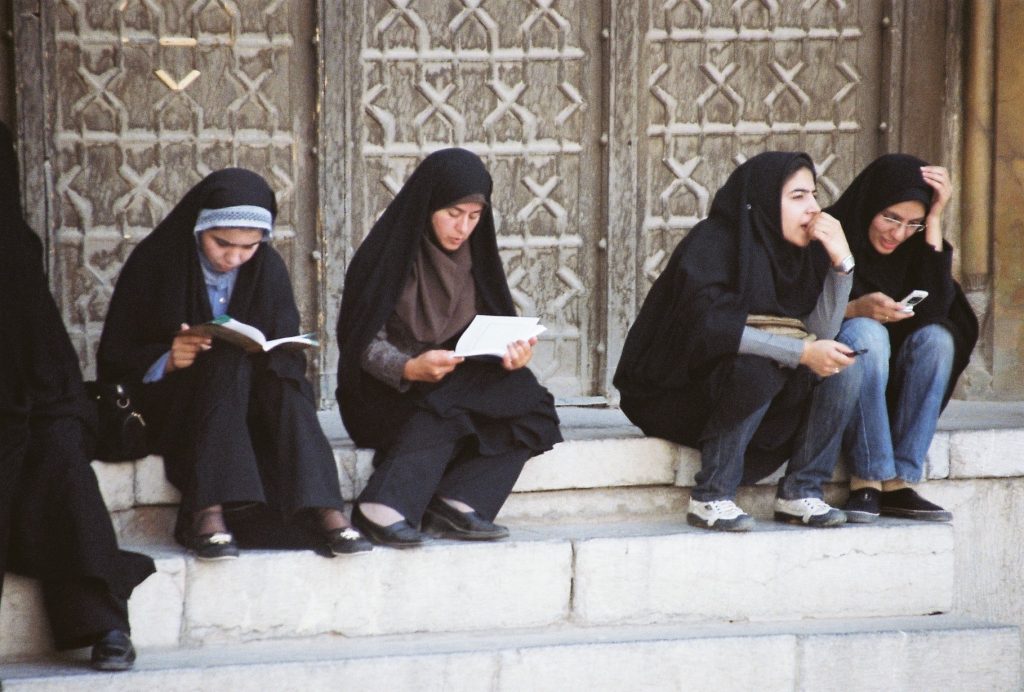“The Writer’s Ark,” nonfiction by Nancy Willard, appeared in the Spring 1997 issue of MQR.
Once upon a time when I was five years old and it was twenty below zero in Ann Arbor, Michigan, and six feet of snow had closed the kindergarten and not even the cat was allowed outside, a delicate knock brushed our front door. My mother opened it and there stood a short elderly woman with a dark, exquisite face.
“Can I come in and warm myself?” she asked. She told us her name was Lily Lee Moore and this was her day to clean Mr. Knight’s house two doors down from ours, but Mr. Knight had gone out and locked all the doors, and she did not have the key to any of them. Her connection with Mr. Knight made our visitor as exotic as if she’d dropped from a distant star. We did not have a cleaning woman and our only dealings with Mr. Knight took place one summer evening when our dog ran off with a flank steak he had imprudently left on his outdoor grill, intending to broil it for dinner. While my mother was washing the supper dishes, she caught sight of Mr. Knight’s cook, in a white apron, wrestling the steak from the jaws of our playful collie. Mr. Knight himself did not honor us with a personal appearance.
My mother led Lily Lee Moore into the living room, offered her a chair by the fireplace, and went off to make a cup of tea for her, leaving me to entertain our guest. What interested me, I thought, could not fail to interest her. I had just set up my Noah’s ark on the coffee table, and while the tea was brewing, I introduced her to Mr. and Mrs. Noah and their sudden influx of birds and beasts, grand-marching two by two into the ark. As I set up the characters, I told her the story as it had been read to me in Bible School. And Noah went in, and his sons and his wife, and his son’s wives with him, into the ark, because of the waters of the flood. And the animals went in, two by two.
Lily Lee Moore listened politely. At the end of my story, she said, “You left a lot of stuff out.”
I was dumbfounded.
“What did I leave out?”
“All those people who couldn’t get into the ark — what do you think they did while the water was rising?”
To this day the memory of her voice, with its burden of fear and loss, has stayed with me. The river’s rising and rising, and now the water’s up to the windows of the stores downtown. There ain’t nobody left in the Paradise Bar, they’re all looking for high ground. And now the water’s licking the roofs of the big houses all along Hill Street. Whole families are a-climbing the trees, just sitting up there in the forks of the maples, looking down and watching the water. They can see it carrying big branches with the green leaves still on ’em and cars and rooftops right along, right along, and the water is up to the first fork of those trees, and pretty soon they see it’s carrying the bodies of drowned people, and now the water is up to the second fork of the trees, and a woman looks down and says, ‘Lordy, Lordy, here come the dead.‘ The water is carrying coffins, some of ’em open and the corpses gone. And now it’s dark and the wind is roaring and the water is nipping the last fork, and there ain’t nothing in sight but the tops of the trees. The last woman on earth — I ain’t counting Noah and his kin, ’cause they’re on the water — looks out and sees the ark, rocking and tossing, and she thinks, ‘They’re gonna make it through, and I ain’t.’
And then the water slurps over her and there ain’t another living thing that’ll make it through this storm except the folks in the ark.
Beyond the living room window, icicles bared their teeth. Lily Lee Moore, safe in the ark of our house, sipped her tea and warmed her feet in front of the fire. And I have Lily Lee Moore to thank for my first lesson in the art of fiction.
Or, more specifically, my first lesson in point of view. It took me a long time to realize she’d added nothing to the story that wasn’t already there. Any traditional tale gives you three kinds of characters. The main characters are important enough to have names — Noah, Cinderella, Beauty, Snow White, Hansel and Gretel. The minor characters have names, of course, but often the storyteller chooses not to give them. In the story of the ark, Noah’s sons are named, but all the women are clumped together under a single noun: their wives. The moment you name a minor character, he or she is minor no more.
When writers begin to fiddle with those traditional stories, the minor characters see their chance for glory. Though Noah is the hero, it’s hard to identify with someone whom God has designated as the most righteous man on the planet. The righteous man may save us from our follies but he doesn’t help us laugh at them. It’s no accident that when the pageant of “Noah’s Flood” was performed during the sixteenth century in England, Noah’s wife upstaged her husband, not because she was virtuous but because she was human. She speaks for us when she shouts,
I will not out of this town.
But I have my gossips every one,
One foot further I will not gone;
They shall not drown, by St. John,
And I may save their life.
They loved me full well, by Christ;
But thou wilt let them in thy chest,
Else row forth, Noah, whither thou list,
And get thee a new wife.
[lines 200-208, “Noah’s Flood,” Everyman and Medieval Miracle Plays, ed. A. C. Cawley (New York:Dutton, 1959), 43-4.]
Four hundred years later, she has a name: Mrs. Noah. Robert Duncan writes the story of the ark from her point of view and calls it “The Ballad of Mrs. Noah.” Glen Rounds’ Washday On Noah’s Ark leaves God out and focuses on how Mrs. Noah copes with the problem of drying forty days and forty nights’ worth of laundry on an ark without a clothesline. Norah’s Ark, by Ann Cartwright, gets rid of both Noah and God. We have lost a Noah but gained a Norah. In a godless world, Norah is, nevertheless, the Mother Superior of the animals on her farm. She hears a flood warning on the radio and is struck by the obvious solution: build a boat. No mean carpenter, this Norah: she flips her barn over, stays up all night hammering new walls and making a roof. In the morning she tells the animals, “Let’s call our boat Norah’s Ark,” and sings, “The animals went on one by one.” The ark is inconvenient but cozy. The story ends where it began. Nobody drowns. No promises, no rainbow.
Contemporary fiction for both adults and children includes so many offbeat retellings and “fractured fairytales” that the tale of Norah’s ark hardly raises an eyebrow. Main characters change their identities or their genders, ogres complain of ogre abuse at the hands of plucky princes, the big bad wolf turns out to be a vegetarian. I have read many of these tales, chuckled over some and forgotten others. But Lily Lee Moore’s description of the last woman on earth I have not forgotten. She is neither a main character nor a minor character. The last woman on earth belongs to the third kind of character: the one whom the storyteller has not shown us, the witness we know is present, watching the main action. All those people who couldn’t get into the ark — what do you think they did while the water was rising?
Many years after hearing Lily Lee Moore’s story, I am haunted by the image of Mr. Knight sailing off in an ark he has had custom-built to his specifications. He does not invite us to join him. Is death by boredom preferable to death by water? Mr. Knight does not like dogs, and he would be dreadful company on so long a voyage; the only story he knows is his own. Any writer who takes Henry James’s advice seriously, “Try to be one of the people on whom nothing is lost,” will end up, sooner or later, looking for the hidden story — hidden because nobody was listening for it, and because the water is rising, and because there but for the grace of God go you and I.
Image: Currier & Ives. “Noah’s Ark.” 1874-78. Hand-colored lithograph. The Metropolitan Museum of Art, New York.




